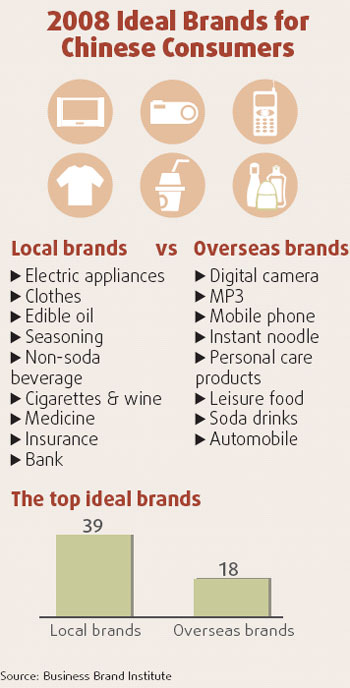Chinese consumers opting for local brands
Chinese consumers prefer local brands to foreign ones, with domestic products the top choice in 39 of 57 categories, or 68 percent, in a recent survey.
The "2008 Ideal Brands for Chinese Consumers" survey was conducted by the Business Brand Institute, International Advertising magazine and the Communication University of China.
Two urban groups - household and potential consumers - were questioned for the survey, with 7,800 respondents nationwide.

Household consumers have the most purchasing power and brand experience and are more sensitive to quality, reputation, service and price. Responses from this group accurately reflected brands' current standing in the market, the survey said.
Senior university students formed the potential consumers group, which is in a transition period and has high brand awareness.
This group is expected to become key purchasers when they graduate and enter the workforce. Respondents from this group provided a forecast for brand trends, the survey said.
Local brands dominated the household appliance, clothing, edible oil, non-soda beverage, pharmaceuticals, banking and insurance sectors.
But respondents preferred foreign brands for digital cameras, mobile phones, sportswear, snack foods, soda drinks, cars and personal care products.
Haier was the top choice across three sectors - refrigerators, washing machines and water heaters. Meanwhile, respondents said Fotile was their preferred brand for kitchen ventilators and gas stoves.
Foreign brand Sony was the No 1 choice for digital cameras and TVs, while Procter & Gamble's Olay brand won out in shower gels and body lotions.
The survey also found that Chinese brands like China Mobile, China Telecom and Bosideng are stand-out performers in their industries - wireless communications, fixed telecommunications and down coats. These three brands were well ahead of their peers, with a gap of 40 percent to the next brand.
"Unlike brand rating programs conducted by professional research institutes, '2008 Ideal Brands for Chinese Consumers' is the first consumer-concentrated large-scale survey on brands in China," Liu Libin, vice-chairman of BBI, said. He said Chinese consumers' brand awareness is increasing as the nation develops and living standards improve.
David A. Aaker, vice-president of Prophet Brand Strategy, said Chinese brands are managing to hold their own as competition intensifies with foreign products.
"They (Chinese brands) have huge potential in the world market," he said.

Many local brands like Lenovo, Haier and Tsingdao Beer have also gained a foothold on the international market, according to the survey.
All of these companies have strong brand awareness, take a long-term approach and have developed comprehensive marketing strategies.
Lenovo's acquisition of IBM's PC arm made it not only the world's fourth largest PC maker but also helped it grow from a local brand into an international one.
Haier has meanwhile been setting up overseas subsidiaries and manufacturing facilities as it tries to expand its presence on the international scene.
And Tsingdao Beer is using its local advantage to buy small domestic breweries and overhaul its brand to fend off competition from foreign brewers.
Lenovo, Haier and Tsingdao are all Beijing Olympic sponsors and are trying to use the event as a springboard into the global market.
"Brand-building is a long-term strategy for any company, so consistency and persistence is paramount," Zhang Shuting, vice-president of the Communication University of China's advertising school, said.
Sources from the three companies said they have mapped out post-Games branding schemes in addition to Olympic- period marketing.
While some businesses shy away from investing in brand-building, Liu said it adds value in the long run and can help companies gain market share.
"Advertising is just one of the many tools that create brands. But stricter quality control, improved after-sales service, environmental protection and community involvement can also contribute," he said.
(China Daily 03/28/2008 page15)














